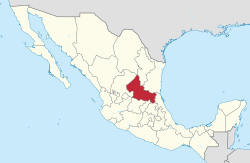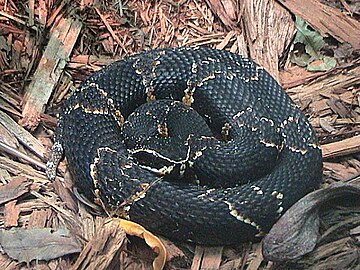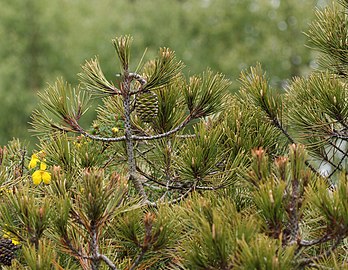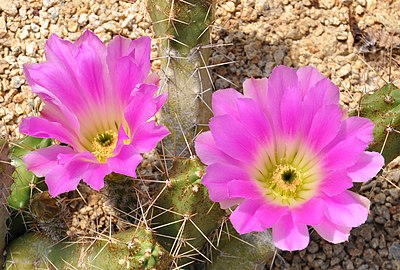|
San Luis Potosí
San Luis Potosí,[a] officially the Free and Sovereign State of San Luis Potosí,[b] is one of the 32 states which compose the Federal Entities of Mexico. It is divided in 59 municipalities and is named after its capital city, San Luis Potosí. It is located in eastern and central Mexico[8] and is bordered by seven other Mexican states: Nuevo León to the north; Tamaulipas to the north-east; Veracruz to the east; Hidalgo, Querétaro and Guanajuato to the south; and Zacatecas to the north-west. In addition to the capital city, other major cities in the state include Ciudad Valles, Matehuala, Rioverde, and Tamazunchale. HistoryIn pre-Columbian times, the territory now occupied by the state of San Luis Potosí contained parts of the cultural areas of Mesoamerica and Aridoamerica. Its northern and western-central areas were inhabited by the Otomi and Chichimeca tribes. These indigenous groups were nomadic hunter-gatherers. Although many indigenous people died during Spanish colonization, Huasteco groups still live, along with Pame and Náhua peoples.  In 1592, gold and silver deposits were discovered, which triggered the establishment of the state.[citation needed] Spanish miners established the first town known as “San Luis de Mezquitique”, modern location of the capital San Luis Potosí. This led to Juan de Oñate being appointed as the first mayor. The State was given the name "San Luis Rey", King Saint Louis, in honor of Louis IX of France, and "Potosí" because the wealth of the state compared to the rich silver mines in Potosí, Bolivia. Settlers had hopes of rivaling the wealth of the Bolivian mine, but this was never truly accomplished. In the 17th and 18th centuries, Franciscans, Augustinians, and Jesuits arrived in the area and settled, then began to build churches and other buildings, many of which are still standing and have been turned into museums and universities. In mid-1821, after the Independence of Mexico, General Jose Antonio Echavarri intimidated and threatened the Mayor and the City Council to surrender the city of San Luis to the Army of the Three Guarantees of Agustín de Iturbide (Ejercito de las Tres Garantias de Iturbide), who at the time was emperor of Mexico. They submitted to his demand, as there was no way to resist, and thus proclamation of Independence of San Luis Potosí was declared. The first Constitution of San Luis Potosí was then written on October 16, 1826, and was in effect until 1835 when Congress proclaimed it centralist. At this point, local legislatures disappeared and state governors were appointed by the central government. This situation lasted until the promulgation of the 1857 Constitution.[citation needed] The state's participation in the Mexican–American War in 1846–1847 gave it the name "San Luis de la Patria",[9] which translates into English, Saint Louis of the Homeland, for having contributed important leaders and ideas during the struggle with the United States. During the Reform War, state involvement was very prominent, and during the French Intervention in 1863, the city of San Luis Potosí became the capital of the country under the order of President Benito Juárez. During the regime of Maximilian, San Luis became an important location. The city was held by the Imperialists until late 1866. In that year, the telegraph line was opened between San Luis Potosí and Mexico City, which opened up communication lines and helped begin the industrialization of the state. GeographyThe state lies mostly on the Mexican Plateau, with the exception of the eastern part of the state, where the tableland breaks down into the tropical valley of the Tampaon River (which continues flowing northwestward until it becomes the Pánuco River, which divides San Luis Potosí from the north-eastern state of Tamaulipas). The surface of the plateau is comparatively level, with some low mountainous wooded ridges. The Sierra Madre Oriental runs north and south through the state, and separates the Mexican Plateau from the Gulf Coastal Plain to the east. The Sierra Madre Oriental is home to the Sierra Madre Oriental pine-oak forests. The easternmost portion of the state lies on the Gulf Coastal Plain, and covered by the Veracruz moist forests. The eastern part is included in the region commonly referred to as "La Huasteca". The Tampaón river and its tributaries drain the southern and southeastern portion of the state. The northern and central portion of the state, including the capital, lie on an interior drainage basin which does not drain to the sea. The mean elevation is about 1,800 m (6,000 ft), ensuring a mostly temperate climate. The state lies partly within the arid zone of the north, while the southern half receiving more rainfall through the influence of the Nortes, which deliver significant amounts of rain. The rainfall, however, is uncertain at the western and northern regions, and much of the state does not have major rivers. The soil is fertile and in favorable seasons large crops of wheat, maize, beans and cotton are grown on the uplands. In the low tropical valleys, sugar, coffee, tobacco, peppers and fruit are staple products. Livestock is an important industry and hides, tallow and wool are exported. Fine cabinet and construction woods are also made and exported to a limited extent. Potosí (in Bolivia) was believed to have enough gold to build a bridge between Potosí and Spain. San Luis Potosí was compared to it upon the discovery of the mines and therefore named after it. At one time San Luis Potosí ranked among the leading mining provinces of Mexico, but the revolts following independence resulted in a great decline in that industry. The area around Real de Catorce has some of the richest silver mines in the country. Other well-known silver mining districts are Peñón Blanco, Ramos and Guadalcázar. The development of Guadalcazar dates from 1620 and its ores yield gold, copper, zinc and bismuth, as well as silver. In the Ramos district, the Cocinera lode was said to have had a total yield of over $60,000,000 in the first decade of the 20th century. Flora and fauna of San Luis Potosí MunicipalitiesAs of 2024, the state of San Luis Potosí is divided into 59 municipalities (Spanish: municipios), each headed by a municipal president (mayor). These are similar in function to counties. As of the 2020 Mexican census, the largest municipalities by population are:
Protected natural areasThe state has several protected elements included in the federal system of protected areas administered by the National Commission of Natural Protected Areas (CONANP):
It also has a Ramsar site declared in 2008, Arrochas y Manantiales de Tanchachín. In addition, it has 12 other natural areas protected by state competition managed by the SEGAM (Secretariat of Ecology and Environmental Management):[10]
Environmental issuesMiningIn 1996, Minera San Xavier (MSX), a subsidiary of Canadian company New Gold, announced plans to start open pit mining at Cerro San Pedro.[11] There was major opposition to the project, but in 2007, the mine started operating, and was still both active and disputed as of 2016.[11] One of the mountains within the state's declared National Sacred Site, Wirikuta, is being purchased for silver mining by a Canadian company, First Majestic Silver.[12] The mountain is an important site for the Huichol ceremonial migration, Peyote hunt, and deer dance. On October 27, 2000, the United Nations Education, Scientific and Cultural Organization (UNESCO) claimed this site as a protected area for its importance as a cultural route and endemic flora and fauna species. Later on June 9, 2001, it was declared as a National Sacred Site under the State of San Luis Potosí's Natural Protection Act. First Majestic Silver Corp. still decided to purchase mineral rights on November 13, 2009, with 80% of their interest within the protected land. The company's current methods includes open pit mining and leaching through cyanide, using two kilograms of NaCN per tonne of ore. While open pit mining itself removes entire habitats and landscapes, the addition of sodium cyanide (with a mean lethal dose of only 0.2 grams) is potentially lethal.[12] In April 2010 the company also opened a new cyanidation plant in Coahuila, Mexico, where it has started producing 3,500 tons of cyanide a day to help them expand their mining efforts.[13] Currently the Huichol people are trying to find outside groups to help them in the conservation of their land and culture by protecting this mountain. Coat of armsThe coat of arms of the state shows Louis IX of France, after whom the state was named, standing on a hill in the town of Cerro de San Pedro, where gold and silver were discovered. The state was well known for its gold and silver mines, so there are two gold bars on the left and two silver bars on the right. The blue and yellow backgrounds represent night and day, respectively. GovernorsThe current governor, as of 2021,[update] is Ricardo Gallardo Cardona of the Ecologist Green Party of Mexico. EconomyThe State has a unique position within the country, since it is located in between three major cities; Mexico City, Monterrey, and Guadalajara, and near four major ports; Tampico, Altamira, Manzanillo, and Mazatlán. Its varied climate patterns and territory along with extensive communications networks enabled it to maintain attractive business environments. Traditionally, the Real de Minas potosino has driven the industrial engines in the state of San Luis Potosí, and as such, nowadays basic metallurgy still has the largest contribution within the gross domestic product of the entity.[citation needed] The main metals and products extracted across mines are zinc, copper, lead, gold, silver, mercury, manganese, and arsenic. Other major industries following the mining lead are in the sectors of chemicals, foods, beverages, tobacco, and textiles. The services sector, also known as tertiary, is second regarding contribution to the state's income with a 21%, followed by commerce, hotels and restaurants with 18%. These combined activities employ 51% of the economically active population or EAP. Agriculture has been a traditional activity, sometimes still practiced in the Huasteca region. Currently, even if it contributes very little to the state GDP, it nevertheless employs as much as 20% of the EAP of the entity. The main agricultural products grown on Potosí soil are maize, beans, barley, sugar cane, oranges, coffee, sour lemon, prickly pear, and mango. Livestock activities are focused on raising sheep, cattle, and pigs. The state is also a contributor to the large automotive industry of Mexico. General Motors now has a plant under construction, San Luis Potosí Assembly, to employ up to 1,800 people which will have the capacity to produce up to 160,000 vehicles per year, or about 440 cars per day.[14] [15] The new plant in San Luis Potosí is an important pillar of the BMW Group's global production strategy who aim to achieve a balance in our production and sales in the different world regions. Its grand opening on June 7, 2019, created 1,500 jobs, eco friendly by being supplied with 100% of CO2 free electricity, and produce 150,000 (3 series model only) vehicles annually. Cummins has also had a manufacturing presence in San Luis Potosí since 1980 and employs nearly 2,000 people there. ABB Group multinational in Mexico moved its headquarters from Mexico City to San Luis Potosí in 2007. Throughout the state, major industrial parks can be seen, especially in highly urbanized areas such as the capital, San Luis Potosí, and other major cities. The minimum wage in the state is 66.45 pesos per day as of 2015.[16] Demographics
The state of San Luis Potosí reports a population of 2,822,255 people. The population growth rate from 2010 to 2013 was about 3.6%. The state's population is relatively young, 60% of its residents being under 30 years of age. The state reports a life expectancy rate similar to the national average, that is, 72 years for men, and 77 years of age for women. Regarding cultural and ethnic diversity, 15% of the state population is indigenous, and the most representative language is Nahuatl, followed by Huasteco. The native people of the state include the Huastec and Pame peoples. [citation needed] According to the 2020 Census, 44.8% of San Luis Potosí's population identified as Indigenous, 8.2% Afro-Mexican, and 39.1% Spanish descent and 7.9% mix/other.[19] Concerning immigrants and people of European ancestry, 63% of the population has some form of European roots, mostly from Spain. During the colonization and establishment of Mexico, there was a constant flow of Spanish immigrants. There have also been large influxes during instabilities in Spain, such as during the Spanish Civil War. Besides Spanish people, there is also a significant population of descendants of Italian immigrants, especially in cities such as Rio Verde and Cerritos. Most of the European peoples have arrived through the state of Veracruz to the East. Nonetheless, due to its relative isolation, the state is one of the nine states in Mexico which report high rates of migration into the United States between the years of 2000 to 2008.[citation needed] EducationThe average schooling rate for those over 15 years of age lies at 7.7 years of education, considerably lower than the 8.1 found nationally. The same portion of those older than the age of 15 yield a 28% dropout rate of primary school. Children under the age of 14 years have a 4% school dropout rate. The literacy rate is about 90.8%, most of the illiterate being the older generation. There is only one major university in the state, Autonomous University of San Luis Potosí (UASLP). Other higher education institutions include:
MediaNewspapers of San Luis Potosí include: Diario Regional El Mañana de Valles, El Sol de San Luis, Esto del Centro, Gran Diario Regional Zona Media El Mañana de Rioverde, La Jornada de San Luis, La Prensa del Centro, and Pulso Diario de San Luis.[20][21] TransportationPonciano Arriaga International Airport serves the capital of San Luis Potosí (named the same) with a variety of domestic and international daily flights. Other cities such as Matehuala, Tamuin and Rioverde also have airports but they only serve domestic flights. Besides airports, the state has an extensive road network, like the rest of the country. Most of the roads are paved in urban areas and highways. Some small towns, however, have cobblestone streets. Notable people and residentsArts and sciences
Politics
Sports
Journalism
See alsoNotes
References
Sources
This article incorporates text from a publication now in the public domain: Chisholm, Hugh, ed. (1911). "San Luis Potosí (state)". Encyclopædia Britannica. Vol. 24 (11th ed.). Cambridge University Press. p. 152. External linksWikimedia Commons has media related to San Luis Potosí. Wikivoyage has a travel guide for San Luis Potosi (state).
|
||||||||||||||||||||||||||||||||||||||||||||||||||||||||||||||||||||||||||||||||||||||||||||||||||||||||||||||||||||||||||||||||||||||||||||||||||||||||||||||||||||||||||||||||||||||||






















